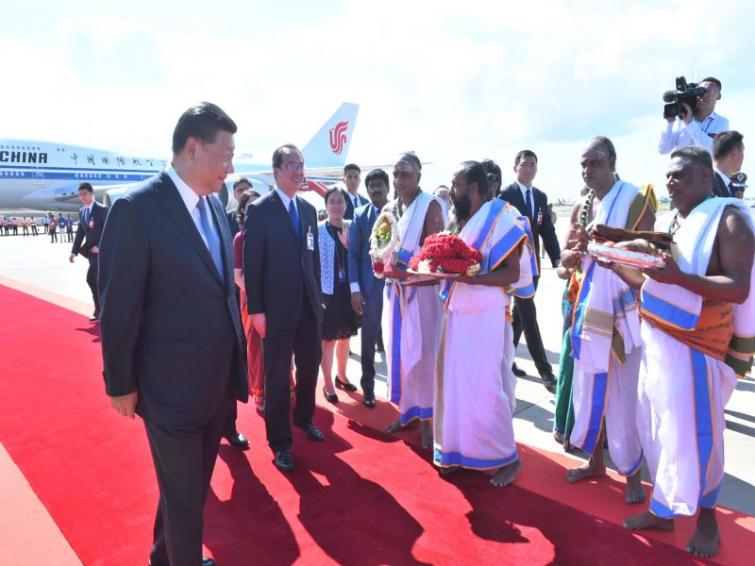
Mamallapuram, Oct 11 (UNI) Chinese President Xi Jinping wrote himself in history on Friday joining the very illustrious club of noted Chinese traveler Hiuen Tsang and former Premier Zhou Enlai.
Mr Xi became the third Chinese leader to visit the World UNESCO Heritage site of Mahabalipuram or Mamallapuram ahead of his second Informal Summit with Prime Minister Narendra Modi.
Mr Xi is the first Chinese leader to visit this place after a gap of 63 years. Attired in black trouser and white full shirt, he was received by Mr Modi, who was clad in traditional dhoti, white shirt and Angawastaram, symbolising Tamil culture and tradition.
Both the leaders shook hands for a while and exchanged pleasantries.
Mr Modi welcomed Mr Xi near Arjunan's penance, one of the three places to be visited by them.
After shaking hands and exchanging pleasantries, both of them had a pep talk and then walked through the heritage sites of Shore Temple and Five Rathas.
During the visit, Mr Modi explained the historical importance of these places built by the Pallavas during the seventh century.
Both the two leaders were seen chatting as they walked through the seventh century monuments built by Pallavas.
Chinese traveler Hiuen Tsang was the first to have visited this ancient coastal town during his long stay at Kancheepuram in the 7th century CE.
In December 1956, the then Chinese Premier Zhou Enlai visited a village called Kulpanthandalam, a few kms from Mahabalipuram, where he also had inaugurated a maternity and child welfare centre.
A picture taken at that time shows a plaque stating "Maternity and Child Welfare Centre opened by His Excellency Mr Chou En-Lai, Prime Minister of People's Republic of China".
The meeting of the two top world leaders at this historic place marked a historic moment aimed at further strengthening and recalibrate the Sino-Indian relations that dates back to the fifth Century Pallava era.
It was for the first time a high-profile diplomatic meeting between two important world leaders was being held in Tamil Nadu.
While Kancheepuram, the capital of the Pallava empire (4th to 9th CE) was an acclaimed centre of learning, including Buddhism and Sanskrit, drawing scholars from far and near, Mahabalipuram was a thriving port, with a flourishing trade with China and the far east apart from the Mediterranean countries.
Support Our Journalism
We cannot do without you.. your contribution supports unbiased journalism
IBNS is not driven by any ism- not wokeism, not racism, not skewed secularism, not hyper right-wing or left liberal ideals, nor by any hardline religious beliefs or hyper nationalism. We want to serve you good old objective news, as they are. We do not judge or preach. We let people decide for themselves. We only try to present factual and well-sourced news.







